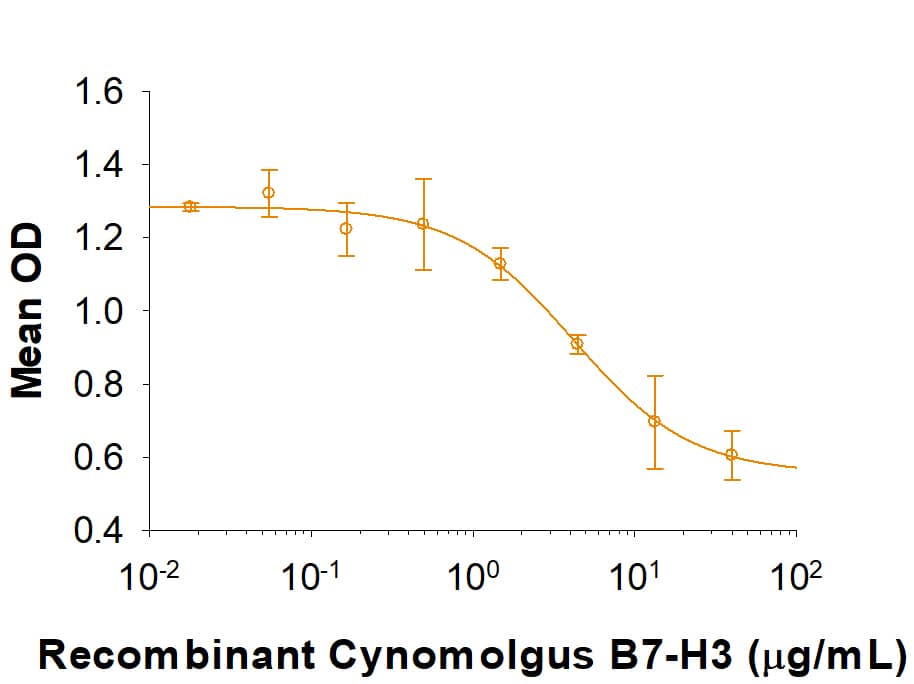Recombinant Cynomolgus Monkey B7-H3 Protein, CF
R&D Systems, part of Bio-Techne | Catalog # 9426-B3

Key Product Details
Product Specifications
Source
Human embryonic kidney cell, HEK293-derived cynomolgus monkey B7-H3 protein
Gly27 & Leu29-Thr461, with a C-terminal 6-His tag
Gly27 & Leu29-Thr461, with a C-terminal 6-His tag
Purity
>95%, by SDS-PAGE visualized with Silver Staining and quantitative densitometry by Coomassie® Blue Staining.
Endotoxin Level
<0.10 EU per 1 μg of the protein by the LAL method.
N-terminal Sequence Analysis
Gly27 & Leu29
Predicted Molecular Mass
48 kDa (Gly27) & 47 kDa (Leu29)
SDS-PAGE
65 - 80 kDa, reducing conditions
Activity
Measured by its ability to inhibit anti-CD3 antibody induced IL-2 or IFN-gamma secretion by human T cells.
The ED50 for this effect is 1-10 μg/mL.
The ED50 for this effect is 1-10 μg/mL.
Scientific Data Images for Recombinant Cynomolgus Monkey B7-H3 Protein, CF
Recombinant Cynomolgus Monkey B7-H3 Protein Bioactivity
Recombinant Cynomolgus Monkey B7‑H3 inhibits IFN-gamma secretion by human T cells in the presence of anti-CD3 antibody. The ED50 for this effect is 1-10 μg/mL.Formulation, Preparation and Storage
9426-B3
| Formulation | Lyophilized from a 0.2 μm filtered solution in PBS with Trehalose. |
| Reconstitution |
Reconstitute at 200 μg/mL in PBS.
|
| Shipping | The product is shipped at ambient temperature. Upon receipt, store it immediately at the temperature recommended below. |
| Stability & Storage | Use a manual defrost freezer and avoid repeated freeze-thaw cycles.
|
Background: B7-H3
20‑40% amino acid (aa) sequence identity. Cynomolgus monkey B7-H3 shares approximately 97% and 88% aa sequence identity with human and mouse B7-H3 respectively. B7-H3 mRNA is found in various normal tissues and in several tumor cell lines, but is not detectable in peripheral blood mononuclear cells (PBMCs). Inflammatory cytokines, such as IFN gamma, and a combination of phorbol myristate acetate (PMA) and ionomycin induce expression of B7-H3 protein on dendritic cells (DCs) and monocytes (4). The receptor(s) for B7-H3 remains unknown. Both murine and human B7-H3 fusion proteins fail to bind to resting T cells, but can recognize activated T cells which stimulated with PHA or ConA, indicating that B7-H3 receptors are induced upon T cell activation (5). B7-H3 was reported to act as a
co-stimulatory regulator to enhance the proliferation of both CD4+ and CD8+ T cells, the induction of cytotoxic T cells, and IFN-gamma production in the presence of TCR signaling (1). B7‑H3 was also reported to play an inhibitory role on T-cell activation. The inhibition may govern through nuclear factor of activated T cells (NFAT),
NF‑ kappaB, and AP-1 factors, three major signaling pathways through which TCR regulates gene transcription, which suggesting that B7‑H3 might have more than one receptor on T cells (6). B7-H3 protein expresses on a wide variety of cancers, including stomach, lung, prostate, kidney, ovary, pancreas, liver, bladder and breast. The role of B7-H3 in anti-tumor immunity is controversial, because B7-H3 has conflicting costimulatory and coinhibitory functions (7).
References
- Chapoval, A.I. et al. (2001) Nat. Immunol. 2:269.
- Sharpe, A.H. and G.J. Freeman (2002) Nat. Rev. Immunol. 2:116.
- Coyle, A. and J.Gutierrez-Ramos (2001) Nat. Immunol. 2:203.
- Kyung H. Yi and Lieping Chen. (2009) Immunol Rev. 229:145.
- Sun M, et al. (2002) J Immunol. 168:6294.
- Hofmeyer KA, et al. (2008) Proc Natl Acad Sci USA. 105:10277.
- Ni L and Dong C. (2017) Immunol Rev. 276:52.
Long Name
B7 Homolog 3
Alternate Names
B7H3, CD276
Gene Symbol
CD276
UniProt
Additional B7-H3 Products
Product Documents for Recombinant Cynomolgus Monkey B7-H3 Protein, CF
Product Specific Notices for Recombinant Cynomolgus Monkey B7-H3 Protein, CF
For research use only
